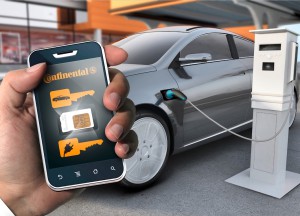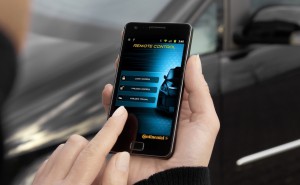
A Continental joint venture, OTA keys SA, is developing a virtual key that could make car sharing a reality.
Carmakers are moving closer to using “virtual keys” that can be embedded in smart phones, according to a leading auto supplier.
Representatives from Continental, a leading supplier of a variety of automotive technology, said this week that the virtual keys that can unlock the vehicle and start the engine are developing quickly and will begin showing up on some cars next year.
“With the variety of solutions Continental offers in its portfolio, the customer has the freedom to decide what technology they want and can choose the key they feel most secure and comfortable with,” said Michael Crane, vice president business Unit Body & Security for the Americas.
The virtual keys are also critical to the expansion of car sharing, which is one of the auto industry’s more promising growth areas in an era where congestion and limitation on parking places are expected to get worse, noted one of Continental’s representatives.
“We want to share your car not your keys. Keys are always a challenge,” he said.
Virtual keys make it easier to lock and unlock cars even when they are scattered in different places.

Using smart phones as virtual keys allows the user to not only start the car, but track its location, unlock it and potentially even park it.
Continental created a joint venture with Belgian company D´Ieteren SA named OTA keys to develop and implement virtual key management solutions for car sharing services, fleet operators and car rental agencies.
(Google heats up car sharing battle. For more, Click Here.)
The heart of the OTA keys’ system is the virtual smart phone key. The smart phone exchanges data with the vehicle using NFC, or the energy-saving Bluetooth standard BLE. The driver uses a smart phone app to book the required vehicle. The OTA keys system sends an encrypted forgery-proof data record to the cell phone.
The virtual key is securely stored in the smart phone. It contains the access authorization for the required vehicle. Using the NFC or BLE standard, the cell phone transmits the data (authentication, vehicle and diagnostic data, user profile) to the reader in the car.
The smart phone can also upload information from the vehicle to the mobile device – including GPS data of the current vehicle position, whether it is locked or unlocked, or more in-depth information such as tire pressure, the amount of gas in the tank and much more. In Continental’s architecture, the smart phone is seeking to communicate with the Continental BLE terminals.
When designing and implementing new access solutions, Continental not only factors in the smartphone, but other mobile devices such as smart watches.
(Delphi, MobilEye want to have autonomous vehicle system ready to roll by 2019. Click Here for more.)
Continental is aware that the smartphone is the close companion of drivers anywhere and is responding to their communications requirements with a convenient and smart solution. The Multifunctional Smart Device Terminal combines wireless charging of the smartphone battery, wireless antenna coupling, and Near Field Communications.
Continental has spent more than two decades adapting wireless technologies for access and start systems. It supplied the first electronic immobilizer back in 1994 and the first Passive Start and Entry or PASE keyless start and entry system in 1998.
Since then, the system has been bolstered with major improvements such as bidirectional wireless communication. Security and reliability are top priorities for Continental when it comes to vehicle access and identification solutions.
The new developments in the fourth generation system also increase driver and passenger convenience. A system currently in the works includes automatic recognition of the driver as they approach the vehicle.
(NuTonomy beats Uber and Google to the punch; launches autonomous taxis in Singapore. Click Here for the story.)
The system can then activate the interior and/or exterior lighting, for example, to allow the driver to locate and access the car more easily in the dark. This also means that personalized features such as seat position, air-conditioning settings, and entertainment preferences can be activated before the driver even enters the car.
